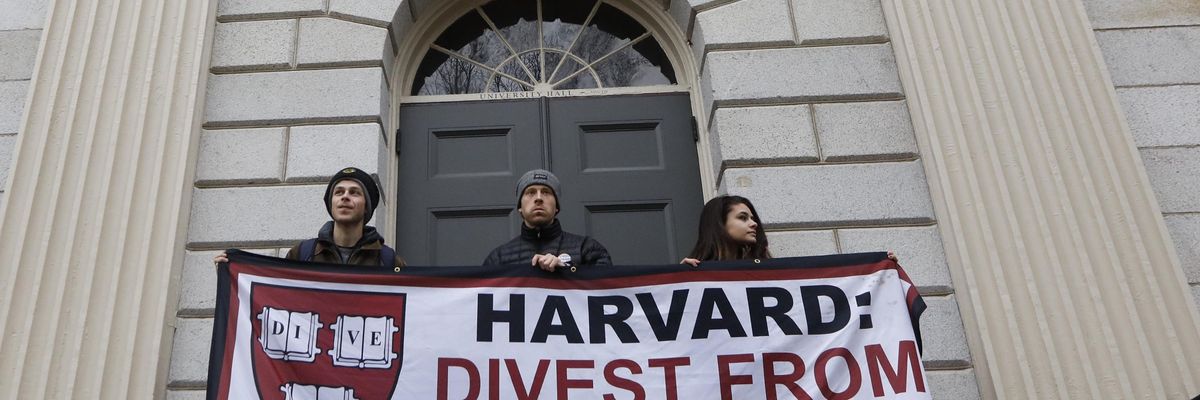Nearly a decade of tireless grassroots activism led by students, alumni, and faculty members culminated in Harvard University's announcement Thursday that it is ending its investments in planet-warming fossil fuels, a decision campaigners celebrated as a major victory for the climate movement.
In an open letter posted to the university's website, Harvard President Lawrence Bacow wrote that the Harvard Management Company (HMC) "has no direct investments in companies that explore for or develop further reserves of fossil fuels" and "does not intend to make such investments in the future."
"Today, we can see proof that activism works, plain and simple."
--Fossil Fuel Divest Harvard
Additionally, Bacow said, HMC's "legacy investments" in private equity funds with fossil fuel industry holdings "are in runoff mode and will end as these partnerships are liquidated."
While Bacow did not use the word "divest," activists said the commitments outlined in his letter would amount to divestment if the university stays the course.
"So long as Harvard follows through, this is divestment," Connor Chung, an organizer with Fossil Fuel Divest Harvard, toldThe Harvard Crimson on Thursday. "This is what they told us for a decade they couldn't do, and today, the students, faculty, and alumni have been vindicated."
With an endowment recently valued at around $42 billion, Harvard is the wealthiest university in the world--and thus a major target of the global fossil fuel divestment movement, which started forcefully pressuring the institution in 2012.
For years, Harvard refused to drop its investments in fossil fuels even as the state of the climate became increasingly dire, protests against the university's complicity in the crisis intensified, and other major institutions--from Georgetown to Cambridge to the University of California--announced their decisions to divest. Just two years ago, Bacow wrote in a letter published by Harvard Magazine that "engaging with" with the fossil fuel industry "is ultimately a sounder and more effective approach for our university" than divestment.
In April of 2020, Harvard pledged that its endowment would be greenhouse gas-neutral by 2050--a commitment that activists slammed as "radically insufficient."
Divest Harvard noted in a series of tweets late Thursday that "from the beginning, Harvard has sought to duck, dodge, and deny: claiming that fossil fuel stocks were necessary for profit, claiming that the endowment shouldn't play a role in fighting climate change, and even claiming that fossil fuel companies are part of the solution."
"It took conversations and protests, meetings with administration, faculty/alumni votes, mass sit-ins and arrests, historic legal strategies, and storming football fields. But today, we can see proof that activism works, plain and simple," the group wrote. "It shouldn't have taken a decade for Harvard to catch up with climate reality. Harvard's intransigence represents a fundamental failure of transparency, governance, and accountability--failings that Harvard must resolve if it wants to rise to the challenges of the future."
Nevertheless, the group continued, Harvard's announcement Thursday represents a "massive victory for activists and for the planet."
"Much more work remains, of course--and our movement will be here to make sure that for Harvard, it's only a beginning when it comes to building a more just and stable future," Divest Harvard said.
Bill McKibben, co-founder of 350.org and a longtime proponent of fossil fuel divestment, celebrated the student and alumni activists who "kept up the fight" for years even as Harvard refused to yield.
"I remember sleeping in the shrubbery outside Massachusetts Hall where the president's office sits, and occupying the alumni office; I remember bringing my since-deceased colleague Koreti Tiumalu to Harvard Yard to give a fiery speech about how this university was drowning her Pacific islands," McKibben, who graduated from Harvard in 1982, wrote in a blog post. "I've watched remarkable ongoing pressure from alumni leaders like former Colorado senator Tim Wirth. And I never really believed that they'd capitulate, because I knew they feared that some graying member of the class of '47 would write them out of his will."
"But the tide has shifted," McKibben continued. "When we fight we often win--even it takes a while. It's not easy to keep a fight going at a college: the administration counts on the steady turnover of students to dampen ardor. But class after class Harvard kids kept the pressure on--just yesterday, as The Harvard Crimson reported, they were rallying once more, as the new freshman class arrived. Their victory matters enormously precisely because Harvard was so recalcitrant."

